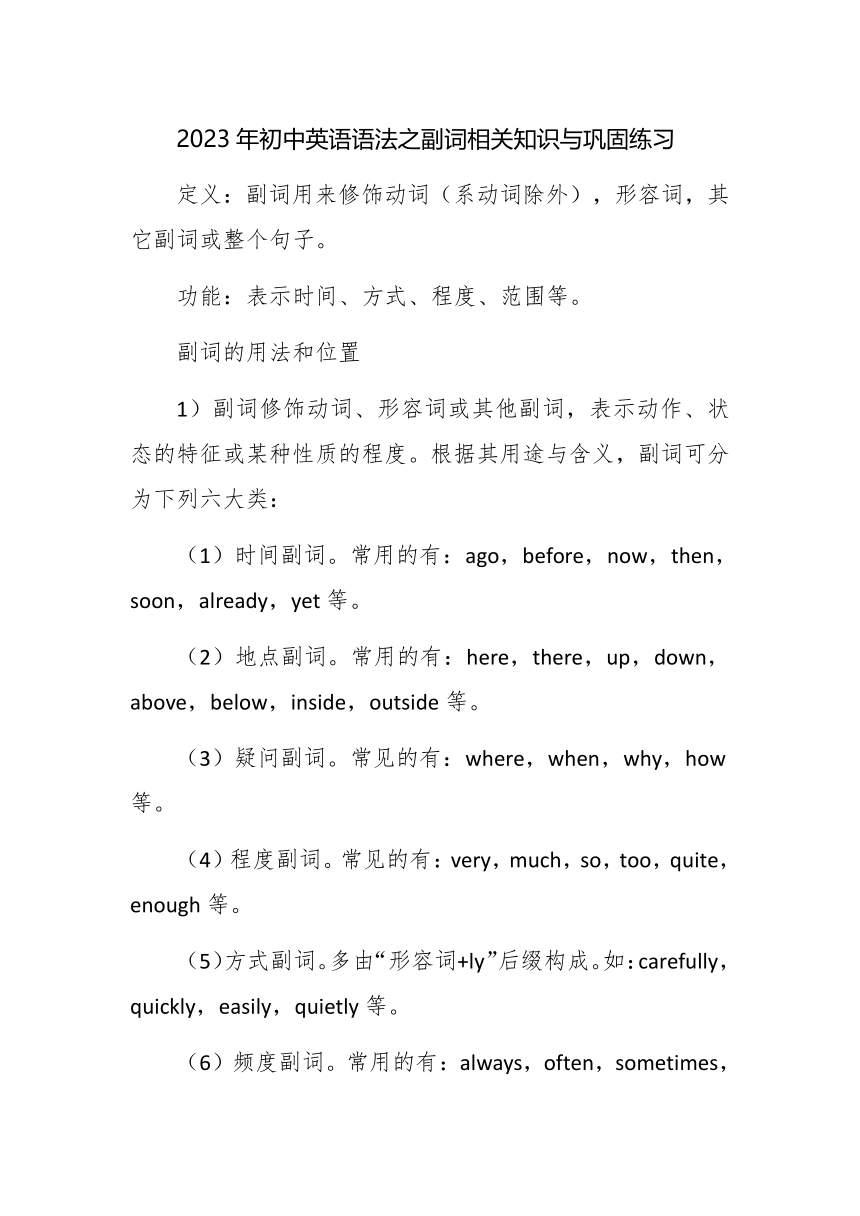
2023年初中英语语法之副词相关知识与巩固练习 定义:副词用来修饰动词(系动词除外),形容词,其它副词或整个句子。 功能:表示时间、方式、程度、范围等。 副词的用法和位置 1)副词修饰动词、形容词或其他副词,表示动作、状态的特征或某种性质的程度。根据其用途与含义,副词可分为下列六大类: (1)时间副词。常用的有:ago,before,now,then,soon,already,yet等。 (2)地点副词。常用的有:here,there,up,down,above,below,inside,outside等。 (3)疑问副词。常见的有:where,when,why,how等。 (4)程度副词。常见的有:very,much,so,too,quite,enough等。 (5)方式副词。多由“形容词+ly”后缀构成。如:carefully,quickly,easily,quietly等。 (6)频度副词。常用的有:always,often,sometimes,usually,hardly,never等。 2)副词在句中主要用作状语。也可充当定语、表语等。如: It’s snowing heavily outside.(状语,修饰动词) I have never heard such a beautiful voice.(状语,修饰动词) unluckily, he failed in this physics exam again.(状语,修饰整个句子) He was too excited to say a word.(状语,修饰形容词) Class is over.(表语) The weather here is different from that of Singapore.(定语) 3)程度副词通常位于被修饰的形容词副词之前,但enough则要放在后面。如: It was much more freezing today than yesterday. He ran so fast that I couldn’t catch up with him. We got up early enough to catch the first bus. 4)频度副词通常位于行为动词之前,be动词、助动词和情态动词之后,但一般不放在句末。如: I have never been late for class. You must always work like that. 5)几个副词同时出现时,其顺序一般为:方式副词+地点副词+时间副词(也可位于句首)。 几个重要副词的使用: 1. enough:修饰形容词或副词,须置于被修饰词后;而修饰名词时放在修饰词的前面。 He is old enough to go to school. 2. too:位于形容词或副词前。 She is too eager to see me. 3. very:置于所修饰的形容词、副词前。 He is very handsome and many girls like to speak with him. 4. much:修饰动词,形容词及副词比较级。 The subject has been talked too much. Her dress is much more beautiful than mine. 5. still: “依旧,仍然”用于肯定句、否定句中。 He still remembers the days they spent together. I still can not catch his words. 6. yet: 位于疑问句末尾时意思是“已经”;用于否定句时意思是“还”。 Have you emptied the dustbin yet I haven't done that yet. 7. only: 根据句意灵活运用。(请翻译下面三个句子!) Only he can tell you how to do it. He can only tell you how to do it. He can tell you how to do it only today. 8. hardly, scarcely, seldom, never本身为否定意义副词,注意使用。 Hardly had we left the station when it began to rain. 几个易混淆的副词: 1. easy: stand easy (= comfortably) easily: It can't be solved easily. 2. clear: The bullet went clear through the window (= directly) clearly: Clearly, he doesn't know anything about it. (= obviously) 3. high: He can jump very high.(高地) highly: We think highly of the good teacher.(高度地) 4. just: We have just know the news.(刚刚) justly: He was justly punished.(公正地) 5. hard: You must think hard.(努力地) hardly: He hardly knows about it.(几乎不) 6. pretty: He is not prett ... ...
~~ 您好,已阅读到文档的结尾了 ~~